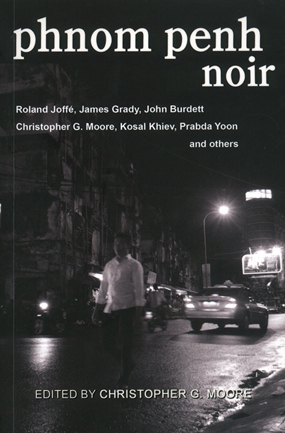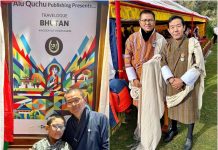Another book of ‘noir’ anthologies, edited by the well known writer Christopher G Moore. Phom Penh Noir (ISBN 978-616-7503-15-8, Heaven Lake Press, October 2012) follows on from the excellent Bangkok Noir publication, which was also edited by Christopher G Moore.
“Noir” as a genre is best explained by Moore’s introduction where he details the background to Phnom Penh after the take-over by the Khmer Rouge, “The country was turned into a vast gulag and slaughterhouse. It is difficult to imagine a darker time in the lives of Cambodians.”

Being an anthology, a collection of short stories, Moore invited a number of authors to take part by submitting their manuscripts, but expanded the resource base by including a songwriter whose lyrics are at the end of the book. Moore describes, “Their collective vision is fired by dark images – of powerful, influential figures, gangsters, fraudsters, shady foreigners, crooked NGOs, corrupt officials and the streets of Phnom Penh.”
There are 15 authors who have contributed, not all are household names (yet), but stand-outs are Moore himself, Roland Joffe, James Grady, John Burdett, Christopher West and Richard Rubenstein, with some of the other authors being tyros, and others, such as the Cambodian ones Bopha Phorn and Khosal Khiev, have not had the vehicle to display their talent until this book.
The launch of this book is taking place at the same time as this review is published in the Pattaya Mail (not quite a coincidence). The venue is the Foreign Correspondents Club of Cambodia and 20 percent of the book profits will go to selected charities in Cambodia.
I do enjoy reading items from able writers. These sentences, for example, from Roland Joffe I found very attractive and evocative, “The mounds of paper that descend endlessly on an NGO in giant flakes of bureaucratic dandruff.” And when describing a failed marriage, “The marriage emptied of passion … (the wife) … filled the ensuing space with regrets.”
Many of the short stories reflect the life of the ex-pat (“barang” in Cambodian) in SE Asian seedy cities, such as Phnom Penh. Many hustling, only a few living there through a feeling of wishing to really improve life for the Cambodian people. John Burdett (at his erotic best) describing civil servants as “…too far gone in Far Eastern decadence… and clearly afraid of all things Khmer.” Christopher Moore seeing the foreign journalists as “not war-zone true believers; they were crazy, hard drinking, hard living, short-lived people who, if they stopped doing what they did, would fall off the edge.”
Moore also finds the ‘noir’ in the refugee camps over the Thai border, where the totally displaced Cambodian people existed (living would be too grand a description) and prayed for relocation in America.
At B. 595 in Bookazine Big C Extra, this is immense value for a book as comprehensive as this one. It is never possible to please everyone, but I believe you will appreciate each short story and the dark side of Cambodia’s Phnom Penh. Like me, some you will like more than others, but as an anthology it is deserving to being on your bookshelf.




